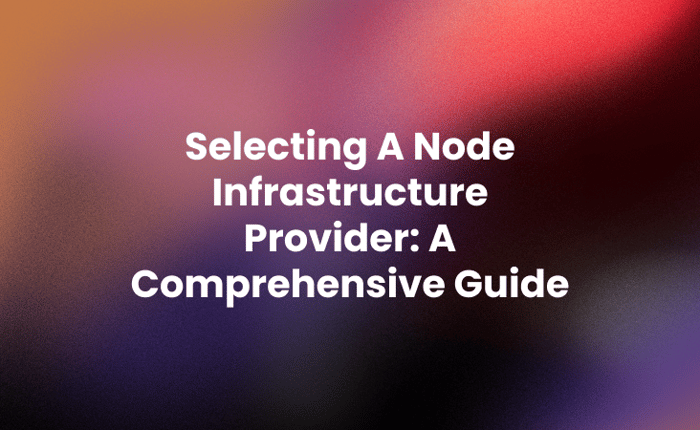Selecting A Node Infrastructure Provider: A Comprehensive Guide

This is the third piece in our educational series on node infrastructure and its significance to the blockchain ecosystem. It builds off of our previous installments — What is Node Infrastructure? And Why Use an Outsourced Node Infrastructure Provider? — which provides excellent context for this post.
What criteria should you consider when selecting a node infrastructure provider?
So you’ve decided to leverage an outsourced provider for your Web3 infrastructure needs… Good decision! Now, you are faced with the often confusing process of finding an infrastructure provider that you can trust for this critical service.
Before jumping into evaluation criteria, we underscore the importance of infrastructure provider selection. Node connectivity is foundational to application liveness and user experience. Simply put, infrastructure service quality determines whether your app is up or down, and impacts a user’s ability to interact with the blockchain. Quality and trust matter.
When evaluating potential options for your node infrastructure, be sure to look beyond surface-level features and misleading claims. For example, the availability of a dedicated node does not automatically guarantee a superior connection compared to providers offering shared nodes. Similarly, the number of networks supported by a provider does not necessarily reflect their expertise in node setup compared to those focusing on a smaller selection.
To make an informed decision, consider the following factors when assessing a node infrastructure provider:
- Reliability: A reliable provider should offer nodes with uptime close to 99.9%, backed by verifiable statistics. Leading providers even have global architecture ensuring almost no outages.
- Speed: A fast and responsive connection to the node is critical. Most providers maintain response times between 100–150ms. Some of the top-performing node infrastructure providers can achieve impressive speeds in the tens of milliseconds.
- Scalability: Evaluate how quickly a provider can deploy new nodes. Manual setup may take up to 10 hours, while more advanced infrastructure providers have streamlined processes, enabling them to automate node deployment and reduce setup time to just a few minutes.
- Geographic Coverage: Geographic coverage allows providers to distribute their nodes across different locations, reducing the risk of a single point of failure. In the event of an outage or disruption in one location, services can continue to operate from other geographically dispersed nodes, ensuring uninterrupted availability.
- Compliance: A provider should have or be seeking SOC2 Type 1 and Type 2 compliance to ensure the highest standards of data security.
- Comprehensive Platforms: Platforms that offer a holistic approach to Web3 can give you the most reliable and comprehensive connectivity to Web3. For example, Validation Cloud is one of the few providers in the space to offer node, staking, and data-as-a-service in one easy-to-use platform.
There is no “one size fits all” solution when determining the best node infrastructure provider. However, when evaluating potential options, it is advisable to consider the key factors listed above. A combination of these factors will enable individuals to make an informed decision and choose the provider that aligns best with their specific needs.
In summary, trust and professionalism form the foundation of a successful partnership with a provider. The reliability of the provider is paramount, with uptime close to 99.9% and verifiable statistics as indicators of their dependability.
You can try Validation Cloud’s fast, scalable, and intelligent node infrastructure platform for free today at app.validationcloud.io. Learn more about Validation Cloud at validationcloud.io.
About Validation Cloud
Validation Cloud is a Web3 data streaming and infrastructure company that connects organizations into Web3 through a fast, scalable, and intelligent platform. Headquartered in Zug, Switzerland, Validation Cloud offers highly performant and customizable products in staking, node, and data-as-a-service. Learn more at validationcloud.io| LinkedIn | X


